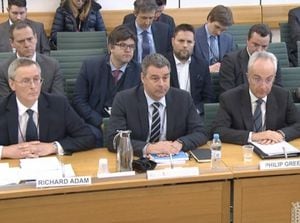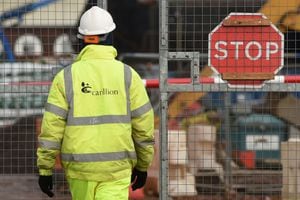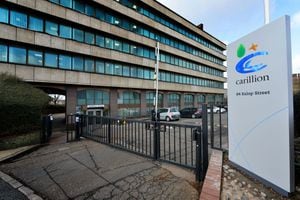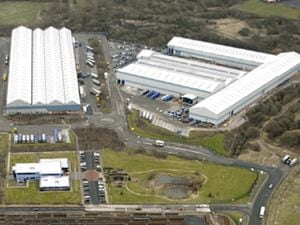'Recklessness, hubris and greed': Carillion 'shysters' slammed by MPs
Carillion's bosses have been dismissed as ‘shysters’ as MPs published a searing report on the Wolverhampton company's collapse.

Directors at the construction and services giant were too busy ‘stuffing their mouths with gold’ to worry about the workers and should face the possibility of disqualification, according to the scathing final report from a joint inquiry of two select committees.
Carillion became a ‘giant and unsustainable corporate time bomb’, said the Work and Pensions and Business Select Committees.
A damning report, published today following weeks of hearings, added: “Carillion’s rise and spectacular fall was a story of recklessness, hubris and greed.”
Dash for cash
Pulling no punches, the report says: “Its business model was a relentless dash for cash, driven by acquisitions, rising debt, expansion into new markets and exploitation of suppliers.
“It presented accounts that misrepresented the reality of the business, and increased its dividend every year, come what may.

“Long-term obligations, such as adequately funding its pension schemes, were treated with contempt.
“Even as the company very publicly began to unravel, the board was concerned with increasing and protecting generous executive bonuses.
“Carillion was unsustainable. The mystery is not that it collapsed, but that it lasted so long.”
Same story, same greed
And MP Frank Field, chairman of the Work and Pensions committee, went further, saying: “Same old story. Same old greed.
"A board of directors too busy stuffing their mouths with gold to show any concern for the welfare of their workforce or their pensioners.
"They rightly face investigation of their fitness to run a company again.
COMMENT: Time to make Carillion bosses pay

"Government urgently needs to come to Parliament with radical reforms to our creaking system of corporate accountability.
"British industry is too important to be left in the hands of the likes of the shysters at the top of Carillion.”
Collapse
Carillion's liquidation in January left a £900 million debt pile, a £590 million pension deficit and hundreds of millions of pounds in unfinished public contracts.
So far the collapse of the company has cost more than 2,300 former workers their jobs – more than 300 of them at the headquarters offices in Wolverhampton, where around 160 are left working with the special managers of the liquidation, accountancy PwC, on the winding up of Carillion.

Other companies have taken over hundreds of former Carillion contracts, securing the jobs of around 11,600 other workers but the fate of 3,000 more still hangs in the balance.
Split off from Tarmac in 1999, Carillion became on the UK's dominant construction and services groups, with 450 Government contracts on road and rail projects, cleaning and catering at hospitals and schools, as well as major civil building schemes.
But the company ran into trouble last year, warning that a string of troubled construction projects had racked up losses of £1bn.
Attempts to rescue the company failed and the Government reject a last minute appeal for a bail-out from Carillion in January, putting the business into compulsory liquidation.
Government and the Big Four
In the final report of an inquiry into the spectacular failure of the company, the two select committees also attacked the Government for ‘lacking’ decisiveness and bravery to tackle failures in corporate regulation.
But it added: "The Government was correct not to bail out Carillion. Taxpayer money should not be used to prop up companies run by such negligent directors."

It also says Britain's Big Four accountancy firms should be broken up following failings exposed by the collapse.
Rachel Reeves MP, chairman of the business committee, said: "The auditors should also be in the dock for this catastrophic crash.
"KMPG, PwC, Deloitte and EY pocket millions of pounds for their lucrative audit work – even when they fail to warn about corporate disasters like Carillion."
Rotten culture
But the most ferocious criticism is aimed at the company's bosses and board of directors.
The MPs said that following its hearings into Carillion's liquidation, it was clear that the board presided over a 'rotten corporate culture' that led to the company’s devastating and hugely costly failure.
They said the Insolvency Service should carefully consider whether former directors breached their duties under the Companies Act and should be recommended for disqualification.
The directors, said MPs, presented themselves in Parliament as “self-pitying victims of a maelstrom of coincidental and unforeseeable mishaps”.
Ms Reeves added: “Carillion’s collapse was a disaster for all those who lost their jobs and the small businesses, contractors and suppliers left fighting for survival.
“The company’s delusional directors drove Carillion off a cliff and then tried to blame everyone but themselves. Their colossal failure as managers meant they effectively pressed the self-destruct button on the company."
As well as criticising a string of Carillion directors, in particular chairman Philip Green, former finance boss Richard Adam and ex chief executives Richard Howson, the report says the company used accounting ‘tricks’ and aggressive accounting policies 'to present a rosy picture to the markets'.
'Unwarranted conclusions'
Former finance director Richard Adam, who was named in the MPs' report as the "architect of Carillion's aggressive accounting policies" and was previously accused of "dumping" shares worth hundreds of thousands of pounds at the first possible moment, said in a statement: "'Despite retiring over a year before Carillion went into insolvency, I am deeply saddened by the events that have since overtaken the company.
"The reasons for the collapse are clearly complex; however, I reject the unwarranted conclusions the committees have reached concerning my role at the company
"I have objected to the committees about quotes that they have misattributed to me. I look forward to contributing to the due process and conclusion of the various investigations that are still ongoing."
Bid to 'minimise impact' of Carillion collapse
A Government spokesman said: "Our priority has been the continued, safe running of public services and to minimise the impact of Carillion's insolvency. The plans we put in place have ensured this.
"The Government wants to see a strong and varied supplier base where companies of all sizes benefit from long term and stable Government contracts.
"That's why we have recently announced a number of measures to support Government suppliers - strengthening our commitment to prompt payment; protecting staff, businesses and small suppliers from irresponsible directors.
"We welcome the report from the joint select committee and will respond fully in due course."





